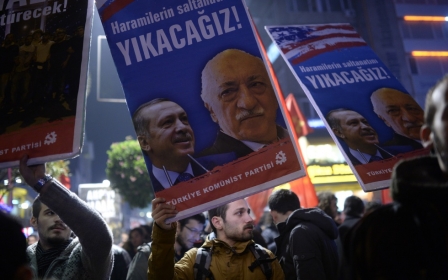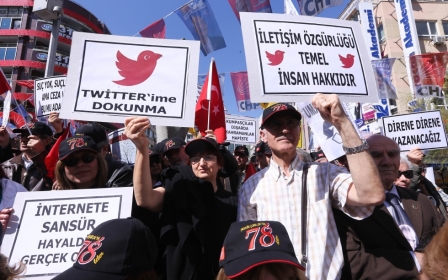Turkey's Gezi Park protestors go on trial in Istanbul

Trials relating to the anti-government protests in Istanbul's Gezi Park started on Tuesday in the city.
The first hearing was seen by a lower Istanbul Court, with all parties involved represented by 32 defendants, plaintiff Ali Cezik and lawyers.
In total, about 255 defendants, including seven foreigners, stand accused of a variety charges including damage of public property and theft. Some are accused of “damaging a place of worship” due to the fact that they took shelter from tear gas attacks in a mosque.
Further sessions are expected to take place each Tuesday, Wednesday and Thursday until a final verdict is reached.
The trials come as the 6th Chamber of the Council of State ruled to cancel the pedestrianisation of Istanbul's Taksim Square - where Gezi Park is located - even though it has been mostly completed by the Istanbul Metropolitan Municipality.
Stay informed with MEE's newsletters
Sign up to get the latest alerts, insights and analysis, starting with Turkey Unpacked
Gezi Park itself has remained untouched, though there has been no official admission that this was due to last year's protests.
The protests erupted in June 2013, initially as an environmentalist protest against the demolition of one of Istanbul’s last green areas, but eventually spiralled into wider demonstrations against Prime Minister Recep Tayyip Erdoğan’s rule.
Proposals to restrict abortions and the purchase of alcohol, rising inequality and unhappiness at the government’s stance on the Syria conflict all fed into unrest which drew people from all corners of Turkish society.
15 people died during the protests, primarily from head wounds due to concussion from gas cannisters fired by police. A 15-year-old teenager, Berkin Elvan died last month after an almost year-long coma, brought on from a hit by a gas cannister, leading to further protests.
Fadi Hakura, an Associate Fellow at Chatham House, told Middle East Eye that he had expected a strong reaction from Erdogan. “I think that Erdogan so viewed these Gezi Park protests as a direct challenge to his rule that he has taken a very robust approach to the protestors.”
He cited the increasingly self-censorious nature of the Turkish media as a sign that coverage of the trial could be skewed. “At least the perception is that the trials may not be as fair as they could possibly be.”
In spite of the continuing controversy around the Gezi Park protest, it was unlikely to affect Prime Minister Reccipy Tayyip Erdogan’s presidential aspirations. “The key criteria for Erdogan’s popularity is the state of Turkey’s economy rather than the protests by mainly liberal and secular Turkish youth against the Prime Minister.”
He pointed to the recent local elections as proof of Erdogan’s continuing popularity.“Despite the widespread corruption allegations and the continued impact of the Gezi Park protests Erdogan was still able to win a strong victory in those elections.”
Tear gas and water cannons were again used against protestors in Istanbul last week, as activists attempted to enter Taksim Square to hold the annual May Day demonstrations. The area was cornered off by security forces who anticipated a repeat of the previous year’s unrest.
Amnesty International condemned last week's police response as a “reprehensible move to crack down on free expression and peaceful assembly.”
Middle East Eye delivers independent and unrivalled coverage and analysis of the Middle East, North Africa and beyond. To learn more about republishing this content and the associated fees, please fill out this form. More about MEE can be found here.




